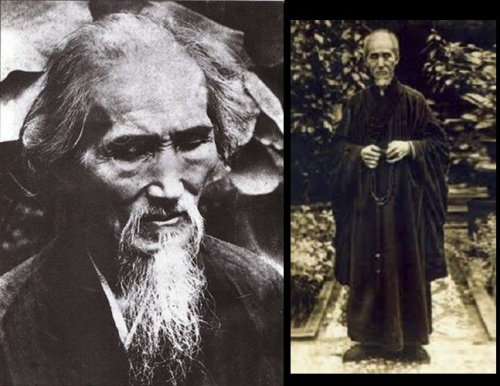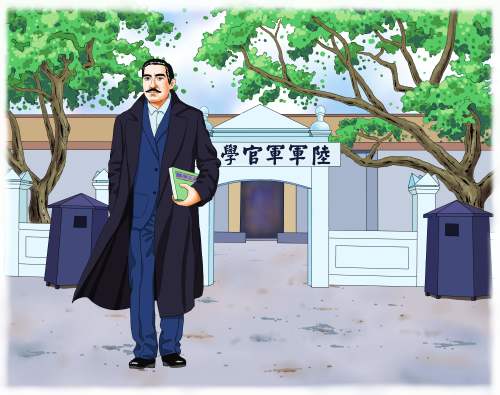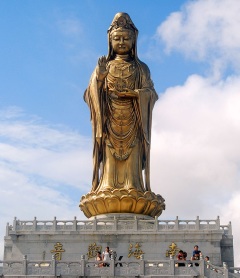
[ad_1]
In 1912, Sun Yat-sen was in Shanghai, preparing to go to Nanjing. (Image source: Getty Images)
Sun Yat-sen advocated freedom of religious belief and freedom of residence, speech and property. These four freedoms gradually disappeared with Sun Yat-sen’s resignation. At that time, an eminent monk named Xuyun predicted that warlords in various provinces would overthrow the freedom guarantees created by Sun Yat-sen and plunge China’s order into chaos. Sure enough, after Sun Yat-sen resigned as interim president, warlords in various places acted arbitrarily and without discipline.
Xuyun admonished the commander of the army
At that time, under the trend of pursuing complete Westernization, there was a trend of destroying temples and Taoist temples in society. Temples in the Jizu Mountain area of Dali, Yunnan were also destroyed. At that time, Li Genyuan was in charge of the Yunnan army. He hated the monks for not observing the rules and precepts, so he personally led the army to the mountains, drove the monks away by force, demolished the temples, and even shot the monks. And declared that he would arrest Monk Xuyun.
Monk Xuyun was the abbot of the Consecration Temple conferred by Emperor Guangxu. He abided by the precepts and was extremely self-denial. Because of his profound spiritual practice, he often performed miracles. He once prayed for a heavy snowfall for the people of the Qing Dynasty who were suffering from the epidemic on a hot summer day in August. Cixi was so moved that she knelt down and worshiped him in the snow.
Li Genyuan led his troops to garrison at Xitan Temple. In just a few days, the army destroyed the Buddhist Hall, the Heavenly Hall, and the bronze statue of King Chicken Feet on the top of the Golden Peak. Xuyun saw that the situation was urgent, so he came to Li Genyuan’s army alone. When the guard saw that it was Xu Yun, he tried hard to dissuade him from entering and told him to run away quickly. Xu Yun ignored him and walked straight into the army.

Shi Xuyun was highly praised for his Zen skills and asceticism. He combined the five Zen sects into one body and rectified Buddhism. He was an outstanding representative of modern Chinese Zen. (Image source: Public domain)
At that time, Li Genyuan was sitting in the main hall with Zhao Fan, the former chief envoy of Sichuan. Zhao Fan knew Xuyun’s profound Taoism and treated him with courtesy. Li Genyuan spoke sternly to Xu Yun and scolded: “What’s the good of cultivating Buddhism?” Xu Yun respectfully replied: “The ancient saints taught the world and benefited the people, and persuaded the world to do good and avoid evil! From ancient times to the present, with We govern the country through Buddhism. Buddhism first teaches people to govern their hearts. The heart is the root of all things. All good and evil arise from the heart. If the heart is right, everything will be peaceful and the world will be peaceful.”
After hearing this, Li Genyuan calmed down his anger and asked again: “What are these clay and wood carvings for? It’s a waste of money.” Xu Yun said: “This is to use clay and wood carvings to express the solemn mercy of gods and Buddhas, and to make all living beings feel awe. If people don’t have awe, If the heart is full of evil, it will cause great chaos and disaster. Whether it is clay sculptures in China or bronze statues in overseas countries, they are all designed to make people feel kind and have good hearts. ”
Li Genyuan looked happy and ordered his left and right guests to bring tea and snacks to entertain Xu Yun. He went on to say that he saw many monks who, instead of doing good deeds, did many strange things and became useless people of the country. Xuyun said: “Monk is just a general term, and there are differences between saints and ordinary people. You can’t expel all the monks when you see one or two bad monks; you can’t curse Confucius when you see one or two unworthy scholars. Today. Sir, you have strict military discipline in commanding the troops, but how can you Can everyone be as smart and upright as the commander-in-chief? The sea does not disdain small fishes and shrimps, so it has vast and profound qualities. Monks have different qualifications, but if they can persist in practicing and cultivate over time, their bad roots will be eliminated, and not all of them will be useless. ”
When Li Genyuan heard this, he looked happy and asked Xu Yun to continue. During this period, Li bowed his head and paid tribute several times, smiling broadly. That night, Li Gengen sincerely persuaded Xu Yun to join him for the evening meal and talk with him at night by holding a candle. After the conversation, Li Genyuan sighed regretfully: “It turns out that Buddhism is so vast. But I killed monks and destroyed monasteries, and my sin was very deep. What should I do?” Xu Yun comforted him: “This is caused by the trend of the moment, and it is not all the fault of the commander-in-chief. Yes. If the commander can protect the monks and monasteries in the future, he will also have great merits.” Li Genyuan was relieved when he learned that there was hope for salvation.
At dawn the next day, Li Genyuan followed Xuyun to Zhusheng Temple. Along the way, you can see the golden light of Jizu Mountain. From the top of the mountain to the foothills, all the vegetation turns golden. According to legend, there are three kinds of light in Jizu Mountain, namely Buddha light, silver light and golden light. The Buddha’s light occurs every year, but people have only seen the silver light and golden light a few times since the establishment of the mountain. Li Genyuan was very moved at the time and immediately offered Xu Yun the gift of a disciple and asked Xu Yun to serve as the chief abbot of various temples in Jizu Mountain. (Editor’s note: From “The Chronicle of Monk Xuyun’s Autobiography”)

Monk Xuyun admired Sun Yat-sen’s enlightened attitude towards religion. (Picture source: Drawing: Zhiqing/Look at China)
Sun Yat-sen inscribed a plaque “Drinking in the Light”
Li Genyuan stopped destroying temples, built Buddhist colleges, and often gave medicine to the people. After that, Xuyun set off for Shanghai. Due to the new constitution formulated by the Shanghai Buddhist Association, there were conflicts with all parties. Xuyun came to mediate with everyone this time and met with Mr. Sun Yat-sen in Nanjing.
In his conversation with Xuyun, Sun Yat-sen mentioned that he advocated learning overseas democracy and new science to save China, and also advocated the preservation of China’s old traditional culture in order to establish new moral standards and the traditional cultural thoughts of the Chinese nation. . He also believes that some traditional “superstitions” should be eliminated, such as using charms to cure diseases, extravagant sacrifices, burning incense or making money on the birthdays of gods and Buddhas, or sacrificing people. These bad customs should be reformed.
Xuyun said that the world’s fascination with gods has confused the true Buddhist faith and caused people to misunderstand the essence of belief in Buddhism.
Sun Yat-sen believed that Christ advocated fraternity and giving, while Buddha advocated compassion and charity; Christians should love their enemies, and Buddha taught people to be equal to both enemies and relatives; Christ said that the kingdom of heaven is in the heart, and the Buddha’s teachings come from the heart; perhaps Christianity and Buddhism are originally They have the same origin, so they oppose attacks between various religions and even launch wars for this purpose.
Xuyun admired Sun Yat-sen’s enlightened attitude towards religion. He talked about a banned book in the Western Vatican, namely “The Acts of the Disciples on the Water” written by Jesus’ disciple Peter. The book mentioned that after Jesus turned 18, he studied Buddhism in India for more than ten years, and then returned to Persia and Turkey. Israel preaches sermons. Xuyun believes that Buddhism and Christianity have the same origin.
What Xuyun said surprised Sun Yat-sen. He said that if “The Acts of the Disciples on the Water” was still circulated, he would definitely study it.
In the second year of the Republic of China, that is, 1913 AD, Sun Yat-sen consecrated the temples of Xuyun and Jizu Mountain and inscribed a plaque with the words “Drinking Light and Likeness”. Drinking light is the name of Mahakasyapa, a disciple of Sakyamuni. Kassapa’s previous life was a metallurgist, a technician who melted gold and shaped the golden Buddha. Because he worships gods and Buddhas devoutly, he will receive great blessings after his birth. Not only was he born into a wealthy family, his family was as wealthy as his country’s, but his appearance and manners were also outstanding. When Kasyapa was born, his body emitted purple-gold light. Because his purple-gold light can extinguish all light, it is like drinking away all other lights, hence the name “Drinking Light”.
Adventures in Putuo Mountain

Avalokitesvara statue on Mount Putuo. (Image source: Public domain)
Sun Yat-sen held an open-minded attitude toward religion, and he himself witnessed miracles and recorded them with his signature.
Sun Yat-sen wrote in the inscription “Visiting Putuo Zhiqi” that on August 15, the fifth year of the Republic of China, when he, Hu Hanmin, Deng Manshuo, Zhou Peizhen and others were observing the Zhoushan military port in Xiangshan, they took the opportunity to visit the famous and ancient temples in Mount Putuo. When Sun Yat-sen climbed to the Foding Mountain Sky Lighthouse, looking from a high distance, he felt as if he had the universe in his hands. Looking around, Sun Yat-sen saw a tall archway standing in front of the temple, surrounded by flowers, like a brocade, and precious flags dancing in the wind, which was very magnificent. There were dozens more strange monks watching quietly, as if they were welcoming guests from afar. I saw another round wheel, circling and rotating rapidly, and I couldn’t tell what material it was made of. When Sun Yat-sen was secretly thinking about what kind of power the wheel relies on to rotate, suddenly, the scene in front of him disappeared without a trace.
Sun Yat-sen asked other people traveling with him if they had seen this spectacle, and they all replied no. Sun Yat-sen was deeply surprised and wrote down the incident in his signature.
The world is vast and boundless, and because it has no prejudice against all sentient beings, miracles have never stopped its tracks from ancient times to the present. However, people will block the infinite world beyond the vastness because of their own concepts.
Editor in charge: Wen Li
Short URL:
All rights reserved. Reprinting in any form requires permission from this site. It is strictly prohibited to create mirror websites.
[Honorary Members Wanted]Streams can merge into the sea, and small kindnesses can achieve great love. We sincerely recruit 10,000 honorary members from Chinese people all over the world: each honorary member only needs to pay a subscription fee per year and become an honorary member of the “Look at China” website, which can help us break through censorship and blockade and provide services to at least 10,000 mainland Chinese compatriots. Provide independent and true key information to warn them in times of crisis and save them from great plagues and other social crises.






